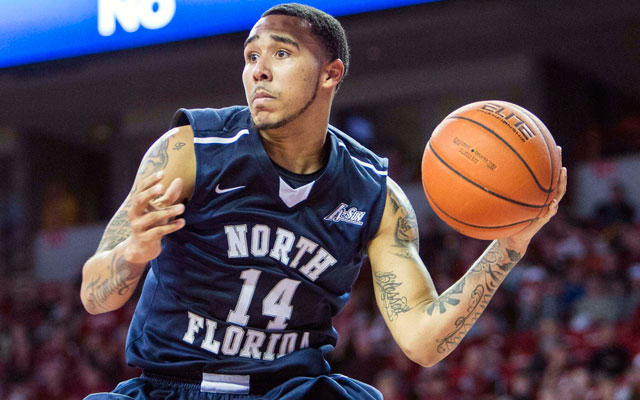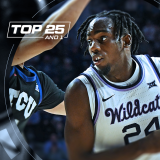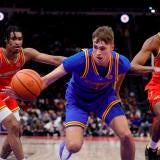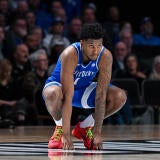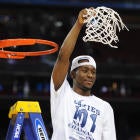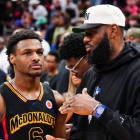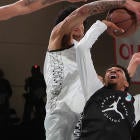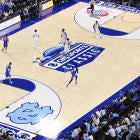The Atlantic Sun had a pretty wild regular season, with six of the eight teams finishing .500 or better and the final two weeks featuring a five-team race for the regular-season championship.
Somehow, the conference tournament has been even crazier.
Stetson, despite being ineligible for the NCAA Tournament and 10-21 coming into Atlantic Sun Tournament play, has won its way into the conference tournament final, where it will take on Florida Gulf Coast after the Eagles trounced regular-season champion North Florida by 33 points on Thursday night.
However, North Florida's hopes of becoming an NCAA Tournament giant killer are not yet dead. Atlantic Sun rules state that if a team who wins the conference tournament is ineligible for the NCAA Tournament, the regular-season champion will receive the league's automatic bid.
Basically what that means is this: if Stetson defeats Florida Gulf Coast to win the Atlantic Sun Conference Tournament, North Florida will receive the league's bid over a Florida Gulf Coast team that beat it convincingly on its home floor only three days prior and won two of their three matchups this season.
That's a little bit awkward, to say the least.
To provide some clarity on the situation, I got on the phone with Atlantic Sun commissioner Ted Gumbart to help explain exactly how this series of events unfolded. The questions I had for him were two-fold. First, why was Stetson in the Atlantic Sun Tournament to begin with if it was ineligible for the NCAA Tournament. And second, how did the league come about creating a series of rules that awards its regular-season conference champion a bid over a team that goes further in the conference tournament.
Why Stetson was in the field
Stetson is ineligible for the NCAA Tournament after failing to reach the Academic Progress Rate guidelines established by the NCAA for postseason eligibility by one point. The Hatters fell below the four-year threshold when an NCAA audit resulted in one change to the calculated results in 2012 and through allowing student-athletes to voluntarily depart the university.
So why are they here? That goes back to a series of rulings that took place in the summer of 2014. First, the NCAA ruled in June 2014 that conferences were allowed to create their own criteria for awarding automatic bids to NCAA Tournaments. This allowed for contingency plans to be put into place if an ineligible team won the conference tournament.
"Before this, our policies did not allow ineligible teams to play in our tournament because we did not want our conference to risk losing our bid," Gumbart said. "That ruling changed the equation for us."
At the time, this particularly affected the Atlantic Sun, which had Northern Kentucky in its league. Northern Kentucky was in the midst of the four-year transition period entering Division I, meaning it was ineligible for postseason play. The league then decided to allow Northern Kentucky to play in its league championships in all sports, as the NCAA now allowed the leagues themselves to make the decisions on how to award their automatic bid.
"The rationale for keeping them out of our tournaments was that they would, if they win, eliminate an opportunity for one of our teams to play in a national championship," Gumbart said. "Once we learned that wouldn't be the case, we put together criteria and the NCAA approved it. So we were able to allow Northern Kentucky to play in our soccer tournament, our volleyball tournament, and our basketball tournament among others. We were able to provide an opportunity to our student-athletes. Those seniors were never going to get that chance, and we were now able to provide it. So that was the rationale: if you're in the conference, you should be allowed to play for a conference tournament."
Within that criteria, the league decided to amend its automatic qualifier policy, stating that the team that wins the conference tournament still gets the bid. However, if a team ineligible for the NCAA Tournament wins the conference tournament, the automatic bid reverts to the regular-season champion. If there is a tie atop the league, the next tiebreaker is then that the team who goes furthest in the Atlantic Sun Tournament among the tied teams gets the bid. If those teams advance equally as far, the highest-seeded team goes.
That is the backdrop for the league's ruling with Stetson. Back in the summer of 2015 when Stetson was ruled ineligible, the school filed a series of appeals to attempt to regain its place in the postseason. The NCAA denied its appeal, but the Atlantic Sun is not bound by the same rules. In an appeal heard by the council of university presidents, Stetson was granted partial relief from conference sanctions. Part of that relief was allowing it to participate in the Atlantic Sun Tournament while also receiving a reduced portion of the conference's revenue distribution and putting the money that it did get toward a mentoring program to help address the concerns that got it there in the first place.
"We determined that they would be eligible because the 2016 team is doing very well academically and had nothing to do with the 2012 issue," Gumbart said. "So the decision was made to allow them to play. We are in the business of providing opportunities for student-athletes. The presidents discussed it vigorously, and that's where they came out."
They understood that the scenario unfolding now was possible, but ultimately decided on going through with it.
"The comment that was raised was: 'if it's the right thing to do, it's the right thing to do.'" Gumbart said. "So the possibility of how the tournament would play out really was a non-issue. This was a possibility, it wasn't anticipated necessarily, but it was a possibility and if they get an opportunity and take advantage of it, good for them."
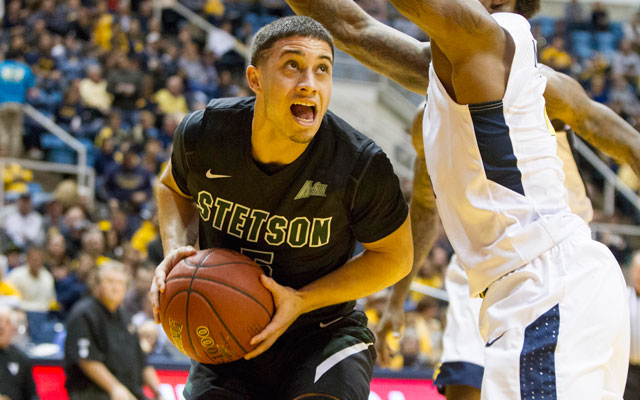
Why the regular-season champion gets the bid
The second part to this is obviously the policy stating that if an ineligible team wins the Atlantic Sun Tournament, the regular-season champion becomes the automatic qualifier. Some people believe that the team who goes furthest in the conference tournament should get the bid. So what went into the decision to give it to the regular-season champion?
There were plenty of factors. The idea of upsets hindering the automatic qualifier for the league played a role. Some said that the league should determine its automatic qualifier solely through tournament play. Others argued for rewarding regular-season accomplishment. Ultimately though, one sentiment won out.
"We actually had quite the discussion with our athletic directors," Gumbart said. 'What the pros and cons were as far as whoever goes furthest in the tournament or sending a regular-season champion.
"Overall though, the deciding factor was the sentiment that we wanted to send a champion."
That's ultimately how you get into a situation where Stetson is now playing proxy for North Florida. The Oberyn Martell to North Florida's Tyrion Lannister, so to speak.
"The prevailing sentiment was the tournament in basketball is three games," Gumbart said. "You have to win three games. If you didn't win the tournament, you didn't win the AQ. So the fact that it then goes to the regular season champion that you beat by 33 the night before is a little bit of a different scenario. But it's something that was contemplated in the decision-making process."
For his part, Gumbart believes in the contingency plan set out by the conference.
"FGCU has to win a game to be the AQ recipient," Gumbart said. "If they don't, really it's Stetson who is our tournament champion, and as Stetson is ineligible to go so it passes to our regular-season champion, which is UNF. That's the criteria we've set. I still think that's an appropriate way to go about it. And our decision-making process was sound, and I think it's something you live with when these circumstances arise."
